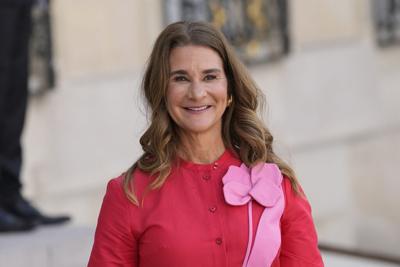More than 80 organizations that provide health care for women all over the world received grants Wednesday totaling $250 million from Melinda French Gates after a year-long application process.
French Gates said the majority of the recipients of the Action for Women’s Health challenge have not previously received funding from her organization, Pivotal, or from the Gates Foundation, which she founded with her ex-husband Bill Gates. She stepped away from the Gates Foundation last year.
“It will be instructive for the world to see what it looks like when organizations like this aren’t so chronically underfunded,” French Gates said in written responses to The Associated Press, which receives funding from Pivotal for news coverage.
The grants, which range between $1 million and $5 million, were awarded through a competition that was open to nonprofit organizations from most countries. French Gates said the point of holding such an open call is to learn about organizations that aren't already known to major funders. The Chicago-based nonprofit Lever for Change ran the application process and said more than 4,000 organizations from 119 countries applied.
“This seems to be a topic that resonates," said Cecilia Conrad, CEO of Lever for Change, of global women's health. “So I’m excited about helping to uplift and elevate the profile of these organizations with other funders.” Her organization often provides donors, both large and small, with advice about what organizations to support, drawing from the list of finalists who have applied to the grant competitions they run.
This is the second largest funding competition that Lever for Change has hosted, after MacKenzie Scott gave $640 million to community-based nonprofits in the U.S. in March 2024.
For the Likhaan Center for Women’s Health based in the Philippines, the $5 million grant represents 10 years of funding at their current annual budget.
“I could not contain the joy of people in the room,” said executive director Junice Melgar when she and her staff learned they had been selected.
For 30 years, Likhaan has provided primary care to very poor communities and advocated for policy changes to reflect community needs. Beyond the money, Melgar said the recognition affirms the effectiveness and sustainability of their community-based model.
The investment in global women's health organizations is part of a $1 billion commitment that French Gates made to support women's rights over two years. She also gave $20 million each to 12 individuals to distribute to nonprofits of their choice and has pledged $150 million to boost gender equity in workplaces.
Lisel Lifshitz, the executive director of the small nonprofit Mujeres Aliadas, which also received a grant, said her organization makes "magic” with every dollar they receive. Located in Michoacán, Mexico, Mujeres Aliadas trains midwives and provides education to women and teens about sexual and reproductive health.
“You don’t know what it takes to be very creative in more rural and complicated contexts, talking about security, about poverty, about the many, many things that are missing here,” she said.
For 16 years, her organization has advocated for greater recognition and acceptance of midwives, who blend traditional knowledge and local beliefs with professional training. The funding comes at a critical moment. In 2025, she said two grants they were expecting did not come through because of foreign aid cuts and other policy changes.
“Having this kind of trust-based and unrestricted funding means the world to us,” Lifshitz said.
Since 2000, many gains have been made globally in reducing the number of women who die in child birth, increasing access to contraception and decreasing cases of HIV among women, according to a 2024 report about sexual and reproductive health from the United Nations Population Fund. But the report also found that profound inequalities in health outcomes for women remain within countries and between countries.
Rahel Nardos, director of Global Women’s Health at the Center for Global Health and Social Responsibility, University of Minnesota, said the historic exclusion of women from medical research and a lack of research into issues that impact women specifically, like menopause, contribute to women's poor health.
From her own practice as a specialist in treating pelvic floor conditions, Nardos said she also sees women prioritizing family members and delaying care for themselves, despite living with extreme health problems. Additionally, violence and instability have contributed to stalling progress on maternal mortality, she said, even as it is well-known what combination of treatments and approaches work to prevent these deaths.
Some recipients of Pivotal's funding are developing new tools to reach women who have been left behind. Sabine Bolonhini and Adriana Mallet, cofounders of SAS Brasil, use telemedicine and mobile clinics to provide specialized care to patients in Brazil, who otherwise would have to travel long distances.
For example, in partnership with a university, they have been training an artificial intelligence model to identify likely cases of cervical cancer from images. Bolonhini said that she hopes French Gates' giving will inspire wealthy families in Brazil to also give more to organizations like hers.
“For us, it's also using (the funding) responsibly and being a good role model for how this money can find solutions that no one else has found yet,” Bolonhini said.
Associated Press coverage of philanthropy and non-profits receives support through the AP’s collaboration with The Conversation US, with funding from Lilly Endowment Inc. The AP is solely responsible for this content. For all of AP’s philanthropy coverage, visit https://apnews.com/hub/philanthropy.











